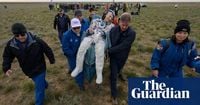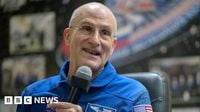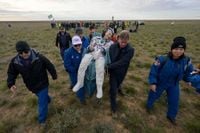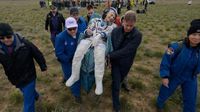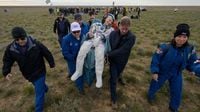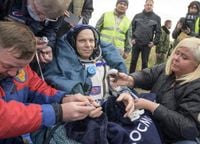NASA astronaut Don Pettit returned to Earth on April 20, 2025, coincidentally celebrating his 70th birthday as he touched down in Kazakhstan. Pettit, alongside Russian cosmonauts Alexey Ovchinin and Ivan Vagner, completed a remarkable 220-day mission aboard the International Space Station (ISS), during which they orbited the Earth 3,520 times.
The Soyuz MS-26 spacecraft, which carried the trio, made a parachute-assisted landing on the Kazakh steppe at approximately 6:20 a.m. local time (01:20 GMT). The landing site was near the city of Zhezkazgan, marking the end of their extensive research assignment in space.
Pettit’s return was marked by a mix of celebration and concern. After emerging from the capsule, some observers noted that he appeared less than fully well, prompting a flurry of social media commentary. Astronomer Jonathan McDowell expressed his worries, stating, "The awesome Don Pettit, who turned 70 today, appeared less than fully well on extraction from the capsule - hopefully nothing serious." However, NASA later reassured the public, indicating that Pettit was "doing well" and that his condition was within expected ranges following such a lengthy mission.
Post-landing, the astronauts were transported to a recovery staging area in Karaganda, Kazakhstan, where they began their readjustment to gravity. Pettit is expected to board a NASA plane to Houston, Texas, while his Russian colleagues will travel to Star City, Russia.
Throughout their mission, Pettit, Ovchinin, and Vagner were involved in vital scientific research, including studies on water sanitization technologies and the effects of microgravity on plant growth and fire behavior. Pettit, a veteran astronaut with four spaceflights under his belt, has spent a total of 590 days in space over his career.
In a significant symbolic gesture, the crew handed over command of the ISS to Japanese astronaut Takuya Onishi just days before their return. This transition underscores the collaborative spirit that has characterized space exploration, even amid geopolitical tensions.
Space exploration remains one of the few areas of cooperation between the United States and Russia, especially considering the strained relations resulting from the ongoing conflict in Ukraine. Earlier this month, another Soyuz spacecraft successfully transported a new crew to the ISS, further highlighting the operational partnerships that persist despite political differences.
As Pettit shared his experiences on social media, he captivated audiences with stunning visuals from space. His posts included breathtaking videos of green auroras and flashes of upper-atmospheric lightning, showcasing the beauty of Earth from above. Fellow astronaut Anne McClain, currently aboard the ISS, lamented Pettit’s departure, calling it the "end of an era" and praising his photographic contributions that have inspired many.
Pettit’s journey is not just a personal milestone but also a testament to the enduring human spirit in the face of challenges. His career, spanning nearly three decades, has seen him contribute significantly to our understanding of life in space. As he embarks on this new chapter post-mission, the world watches with admiration and gratitude for his service.
With Pettit’s return, the legacy of exploration and discovery continues, reminding us of the importance of international collaboration in science and technology. As NASA and Roscosmos plan future missions, the hope is that such partnerships will thrive, fostering a spirit of unity in the quest for knowledge beyond our planet.
In the grand scheme of space exploration, Pettit’s 70th birthday landing serves as a poignant reminder of the passage of time and the remarkable achievements that define human exploration. As he returns to Earth, he not only brings back scientific data but also a wealth of experiences that will inspire future generations of astronauts and scientists.
